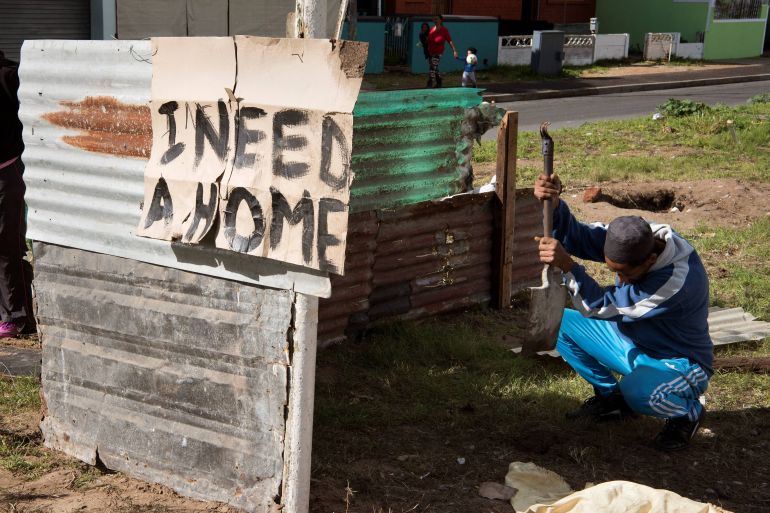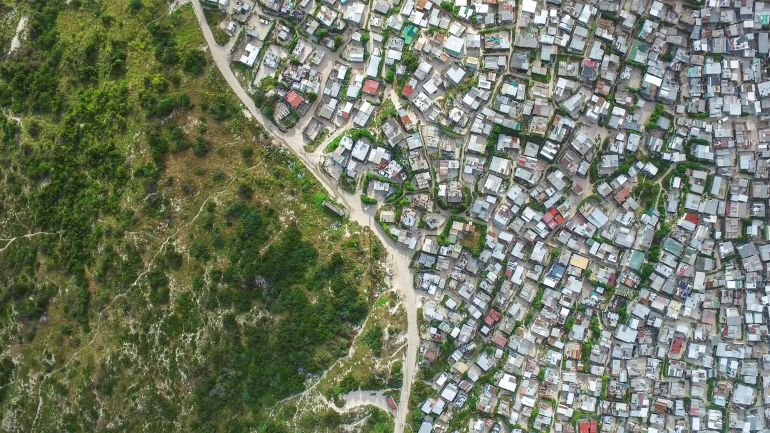- April 11, 2024
- Posted by: humanitarianweb
- Category: Humanitarian News
Published On 10 Apr 2024
Ahead of key elections, hundreds of thousands who were promised houses in opposition-run Western Cape languish on waiting lists.

A man builds a shack in South Arica. In Cape Town’s Mitchells Plain, many people who are left without houses build shacks or informal dwellings in the backyards of other homes [File: Rodger Bosch/AFP]
By
Cape Town, South Africa – In the backyard of a small house in Cape Town’s Mitchells Plain stands a one-room corrugated iron structure.
Inside, Cheryl-Ann Smith, her husband and three grandsons have made a home. They are among thousands of so-called “backyard dwellers” in this impoverished area locals call Lost City.
Here, residents often sublet part of their small plots to others who are even less well-off than they are, creating invisible households without access to basic services like electricity and sanitation.
In the Smiths’ single-room dwelling, there is barely enough space for their two beds, a makeshift cupboard with a two-plate stove, and a round bucket for doing dishes. The one tap they use is situated at the front of the property, and they have to use buckets as a toilet.
Smith, 54, has lived in this limbo for most of her life, waiting for a house from the government for the last 30 years – since before the ruling African National Congress (ANC) won the first democratic elections after apartheid.
“I applied in June 1993 for a council house and imagine it’s 2024 and I am still waiting!” the part-time domestic worker told Al Jazeera.
When the ANC came to power in 1994, providing houses for all was a key government policy. The country went a step further in its 1996 constitution, stating that all levels of government should address the “legacy of spatial apartheid” and that mechanisms in the law would allow for the release of land for affordable housing.
On paper, there is a commitment to provide housing for all. However, in reality, the pace of delivery has not kept up with the growing demand, resulting in an enormous backlog.
The decades of unfulfilled promises have also left voters disgruntled with both the ANC national government and the leading opposition Democratic Alliance (DA) party that runs Cape Town and the Western Cape province.
As the country heads to a crucial general election in May – which analysts say will be the toughest one yet for the ANC – some polls suggest the DA’s majority in the Cape is also slipping, in a sign of an electorate ready to hold their leaders to account.

‘A nightmare’
From 1994 to February 2022, the state housed about five million people in need, according to data from the Department of Human Settlements. However, nationally some 2.3 million households and individuals are still waiting for a home.
In the Western Cape, official waiting lists say more than 600,000 people are in line for a council house, with over 350,000 of those in Cape Town alone.
And housing activists say those on the official lists are only a fraction of the people in need.
In Mitchells Plain, where Smith lives, the local residents’ association said there are more than 15,000 people from the area waiting for homes, but no political will from the authorities to help house everyone who needs it.
“The housing waiting lists are a nightmare and there seems to be no coherence when someone like Cheryl-Ann and others have been on the list for 20 to 30 years,” said Michael Jacobs, the deputy head of the Mitchells Plain United Residents Association.
As a civic organisation, Jacobs said they have tried to engage with the city, provincial and national government to release parcels of land to build houses, but no one is listening.
“The list is a joke; people will die and their children will be adults and they will never ever have a house at the rate we are moving.”
Spatial apartheid
The DA has governed the Western Cape for more than 16 years, while the other eight of the country’s nine provinces are run by the ANC.
DA leaders have consistently painted their territory as an oasis in a country plagued by inefficiency, with party leader John Steenhuisen telling voters in Cape Town this month: “While the eight ANC-led provinces crumble, there is one place left in this country where the hope that we all shared for a better future shines ever more brightly. That place of hope is this DA-led Western Cape province. The Western Cape of Good Hope.”

But for the majority of poor, non-white residents, this rhetoric does not reflect their lived reality.
Cape Town is a geographically segregated city, with the scars of apartheid often hidden away from the pristine beaches and multimillion-dollar properties that make it a global tourist hub.
Mitchells Plain – which sits on a flat, sandy stretch of land some 30km (19 miles) away from the city centre known as the Cape Flats – was set up in the 1970s as a place for the apartheid government to house people of colour following racist forced removals.
It was designed to be separate and segregated from then-whites-only areas, but also from economic opportunities and services. And that unjust spatial legacy remains.
Today, Mitchells Plain is home to close to half a million low-to-middle-income people living in about eight neighbourhoods of varying socioeconomic status.
The area also recorded one the highest numbers of attempted murders nationally during the first quarter of the year, according to crime statistics – and repeatedly makes it into the country’s top 30 areas with the highest crime rates.
Smith and her family have not been spared. Living in Lost City, one of the poorest areas in Mitchells Plain, she has lost three children, two to gang violence, she said, wondering aloud if they would still be alive if she had a real home to keep them safe.
“Lost City is so far from everything,” Smith said. “People say the name is from the fact that we are lost here; no one listens to us or helps us as the backyard dwellers waiting for a house.”
‘Out of touch’ politicians
With the elections less than two months away, housing is not at the top of the agenda for the leading political parties in the province.
The ANC only has two lines in its manifesto related to the issue, where it states it will continue building subsidised housing for vulnerable groups and invest in people partly by ensuring everyone has decent housing and basic services.
In its manifesto, the DA makes no mention of housing at all. But an earlier housing policy from the party says it believes in “adequate shelter” and supports the section of the constitution that requires this right to be “progressively realised”.

Nick Budlender, an urban policy researcher at the housing activist group Ndifuna Ukwazi (NU), sees political parties’ lack of focus on housing as “both interesting and disheartening”.
“Land and housing were key issues in previous elections and, for many, political parties have drifted away and the struggle for housing has less capital. It slipped down the list for politicians,” he said.
Last month, Cape Town’s Mayor Geordin Hill-Lewis, a member of the DA, unveiled what the city calls its “pro-poor budget” for 2024-2025, telling a council meeting that the mission going forward was to invest in infrastructure “on an unprecedented scale”.
“With boldness of vision and firmness of belief, we know that Cape Town can show that it is possible to roll back poverty, that we can overcome the long shadows of our past,” he said.
However, Budlender said: “We have a housing and segregation crisis that is extreme here – but we don’t see enough government action to match this crisis,” adding that the leadership was “failing to use public land to serve the public”.
“This is an example of inequality and segregation in our city,” he said.
Jacobs from the Mitchells Plain United Residents Association said he would also like to see “a rapid release of land from the national government”, which the city could then use to build homes for people who need it.
But “the city is not geared up for the delivery of houses”, he admitted, adding that Mayor Hill-Lewis was “out of touch” with the realities on the ground.
‘They forget about us’
In Lost City, Smith sat with her family outside their single-room dwelling, still hoping that change would come.
Her husband, Russel, 61, lost his right leg years ago and is unable to work. He gets a small disability pension that helps them pay rent to the owner of the plot they stay on, but Smith does domestic work twice a week to earn a bit more money.
A big chunk of what she makes goes into public transport to visit the city council to follow up on her housing application – and sometimes that isn’t enough.
“I usually have to borrow taxi fare to go to the city’s housing office to find out if there is any news on getting a council house, I am so tired and frustrated,” she said, telling Al Jazeera that different officials usually send her from one office to the next.
“In January, they told me I have to wait longer because of some issues, and the houses were not going to be built, so I have to wait another three to four years. This is so depressing.”

Budlender from the NU, whose non-profit group of lawyers and community organisers works to tackle spatial injustice in the city, said: “Sadly, we see cases like Cheryl-Ann and her family all the time.”
“This idea is that the housing waiting list is a rational list, meaning those who are on the earliest will get [homes] first – but that is not how it functions at all and it’s a lot more random.”
For Smith that has meant going to the housing office almost every day to follow up on her application. But so far, it has yielded no results.
Budlender said though millions have benefitted from the state’s housing policy since 1994, for many more, there is no help at all.
“We know of hundreds of thousands of people that live in backyard housing and that number continues to grow,” he said, adding that it is a section of the population the government seems to want to ignore.
“So far there has been no real policy response to backyard housing,” he said. “It’s like they put their heads in the sand.”
As the elections approach, the politicians campaign around rolling back poverty. But to the Smiths and their neighbours, talk means little when the reality of poverty is all they have.
“They only come here when they need us to vote for them and then they forget about us,” Smith said, putting little faith in their party promises.
“I dream of the day I have a house where there is a running tap that I can simply open and wash my grandchild in a bath instead of a bucket,” she said, “and have a toilet I can flush.”
